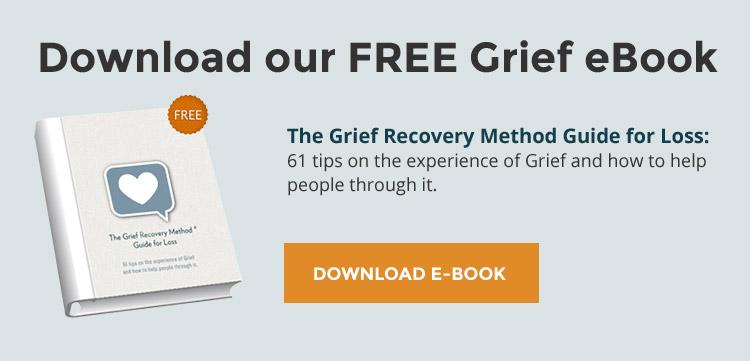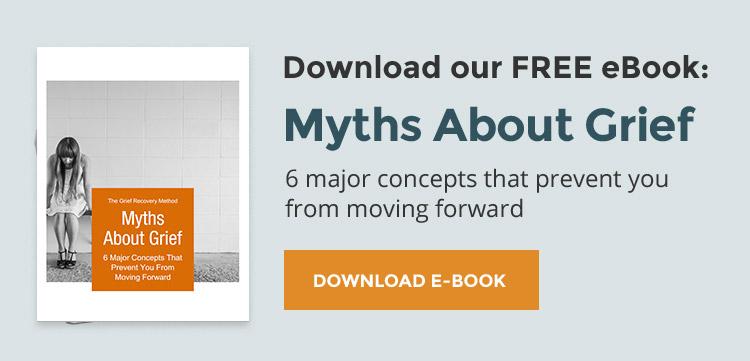One can’t turn on the television, listen to the radio, or scroll a news feed on social media without being bombarded by events transpiring in multiple areas around the world these days. The sheer magnitude of events transpiring is staggering…and the amount of grief being experienced is beyond words. We simply cannot imagine the emotional pain being experienced by so many, for so many reasons, individually and collectively.
Here at the Grief Recovery Institute, our hearts go out to the countless number of people experiencing such profound levels of grief and loss. We know that grief, which is both normal and natural, is the emotional reaction to loss any time there is an end of, or change in, a familiar pattern of behavior. Another way to describe grief is it’s like reaching out for that which is familiar, only to find that when we need it one more time, it’s no longer there.

Currently we are inundated with coverage related to Hurricane Harvey, Hurricanes Irma, Katia and Jose, the earthquake in Mexico, the rising tensions in Asia, the devastation and loss due to monsoons in Asia, the wildfires raging in the northwestern states, the acts of violence and terrorism that continue to grip the middle east and Europe, and the list goes on. The bottom line is countless numbers of people are grieving the loss of so many unmet hopes, dreams or expectations surrounding aspects of their lives or the relationships in their lives. There is a great deal of fear (grieving) surrounding an uncertain future for so many here in the US and around the world.
To quote the co-author of our Grief Recovery books, Russell Friedman, “As members of the family of humankind, we are all affected. Sometimes the impact is in the memories those events stimulate in us about our loved ones who are no longer here. Sometimes those reminders send us forward in fear for our own safety or that of our loved ones. The events that we see and hear about in the news affect us all.” Even as observers to events happening elsewhere, we are impacted.

For some reading this, you may have the reaction of wanting to compare one event to another. Please don’t. Every relationship is unique, therefore every loss or grieving event is unique for each person. Each person experiences their loss at 100% for their unique relationship. When we compare, we rob others of the dignity of their experience or we minimize our experiences. Russell Friedman often used a well-known ditty to illustrate what we mean; I once was unhappy because I had no shoes, until I met the man who had no feet. This illustrates how we are taught, socialized from an early age, to compare our experiences or ourselves, and subsequently the losses we experience, to others. This simply is not possible to do. We have no way of knowing how someone else feels any more than they can know how we feel. At best, we can simply remember how we felt when we experienced a parallel or similar loss. We can never know how someone else feels after his or her loss.
Likewise, we are also socialized and educated to shy away from the topic of grief, as if saying something will somehow make the situation worse. Here at the Institute, we answer calls and emails from people all the time who find themselves not knowing what to say or not say to someone grieving. It’s also common for people to not know how to explain scary events or loss to their children. However, we know there is a great deal of misinformation, what we refer to as the
Myths of Grief, that we were taught and socialized to believe that influence how we react or respond to loss. Without correct information, as adults, we do the best we can with the tools we learned.
We also know that grievers don't lack the courage to heal…what they need is correct information and the specific actions necessary to heal their hearts.

The Grief Recovery Institute is here to help. For 40 years, the Institute has been a resource for grievers throughout the US, North America, and globally. Throughout our existence, we have helped millions recover from grief and loss in their lives. Our mission is to provide the greatest grief recovery assistance to the largest number of people in the shortest period of time. To meet our mission, we have several resources available to those in need.
After Hurricane Katrina, the Institute donated thousands of copies of The Grief Recovery Handbook and When Children Grieve to libraries throughout the United States. We encourage you to seek out a copy of the handbook through your library to learn more about grief, the myths and misinformation we are taught about grief, and the recovery actions of the Grief Recovery Method (GRM). When Children Grieve is an excellent resource for helping children with grief and loss. These books, or any of the
5 grief books authored by the Institute, can also be ordered from our website or are available from nearly any bookstore and online.
There are also thousands of Certified Grief Recovery Specialists throughout the United States, Canada, Europe and around the world. We maintain a
worldwide searchable locator of our Specialists, which allows you to search for one in your area who can help with grief support. Our Specialists facilitate 8-week grief recovery support groups, 1-on-1 sessions, When Children Grieve groups and/or Pet Loss programs.
Lastly, you can visit our
website for more information and resources available, or contact us directly. There are also several free eBooks (a few are included below) available to download with helpful information you can start with today.
From those of us at the Grief Recovery Institute, and the thousands of Grief Recovery Specialists around the world, our hearts are also broken by events transpiring in the world. Our thoughts and prayers go out to everyone impacted by recent events, and events unfolding. No one grieving need be alone. We love you all...we are here to help and support you.
From Our Hearts to Yours ~ The Grief Recovery Institute
If you found this article helpful, we suggest you also read:
Grieving Children: Talking To Your Kids About Loss
The Best Grief Definition You Will Find
Grief: The 40+ Events That Can Be Triggers
7 Signs You're Experiencing Unresolved Grief
The Stages of Grief: The Myth
Disenfranchised Grief
Photo Credit: 123RF Stock Photo


































Add new comment